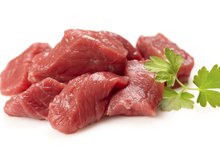What Are the Causes of Elevated Liver Enzymes in Anorexia?
Anorexia nervosa is an eating disorder that involves severe restriction of calories, distorted body image and varied adverse effects on the body. Serious health consequences from anorexia include heart arrhythmia, osteoporosis, anemia, neurological and gastrointestinal problems and liver damage. Elevated liver enzymes are a frequent complication with anorexia and indicate that the liver cells are damaged or inflamed 2. Alanine transaminase (ALT) and aspartate transaminase (AST) are the two liver enzymes most commonly found elevated in blood tests 2.
If you are experiencing serious medical symptoms, seek emergency treatment immediately.
Organ Failure
Elevated liver enzymes can be a warning sign that multi-organ failure is occurring in someone with anorexia 2. Organ failure can happen because of prolonged calorie restriction, whereby the organs go into failure because of malnutrition. If liver enzymes are elevated with anorexia, calories should be administered as quickly as possible under medical supervision 2.
Starvation
How Long Does Iron Stay in Your System?
Learn More
Prolonged starvation that occurs with anorexia causes the body to increase the breakdown of muscle and fat cells used for fuel. These cells are sent to the liver for conversion to glucose. The increase and amount of fat sent to the liver can cause inflammation and liver damage. This damage, which can lead to non-alcoholic fatty liver disease, may cause elevated liver enzymes 2.
- Prolonged starvation that occurs with anorexia causes the body to increase the breakdown of muscle and fat cells used for fuel.
- The increase and amount of fat sent to the liver can cause inflammation and liver damage.
Iron
Women who are anorexic may stop menstruating as a consequence of this disorder. Dehydration may also occur, and the combination of the two can put women at risk for having too much iron in their bodies. Heart and liver damage occur from an excess of iron, as iron is stored in the liver. This may lead to elevated liver enzymes, indicating that the liver is damaged 2.
- Women who are anorexic may stop menstruating as a consequence of this disorder.
- Dehydration may also occur, and the combination of the two can put women at risk for having too much iron in their bodies.
Related Articles
References
- Mayo Clinic.com: Elevated Liver Enzymes
- Eating Disorder Refferal and Information Center: Consequences of Eating Disorders
- PubMed.gov: Is adipose tissue lipolysis always an adaptive response to starvation?: implications for non-alcoholic fatty liver disease; April 2008
- Oh RC, Hustead TR, Ali SM, Pantsari MW. Mildly elevated liver transaminase levels: causes and evaluation. Am Fam Physician. 2017;96(11):709-715.
- Stellpflug SJ. Transaminitis: the lab test that has inflammation. J Med Toxicol. 2011;7(3):252-3. doi:10.1007/s13181-011-0161-7
- Radcke S, Dillon JF, Murray AL. A systematic review of the prevalence of mildly abnormal liver function tests and associated health outcomes. Eur J Gastroenterol Hepatol. 2015;27(1):1-7. doi:10.1097/MEG.0000000000000233
- Shah NJ, John S. Acute and chronic liver failure. In: StatPearls. Updated April 7, 2019.
- American Association for Clinical Chemistry. Alanine Aminotransferase. Updated September 24, 2019.
- Oh RC, Hustead TR, Ali SM, Pantsari MW. Mildly elevated liver transaminase levels: causes and evaluation. Am Fam Physician. 2017;96(11):709-715.
- Kibirige D, Kiggundu DS, Sanya R, Mutebi E. Cholestatic hepatic injury due to a thyroid storm: a case report from a resource limited setting. Thyroid Res. 2012;5(1):6. doi:10.1186/1756-6614-5-6
- Al-Busafi SA, Hilzenrat N. Mild hypertransaminasemia in primary care. ISRN Hepatol. 2013;2013:256426. doi:10.1155/2013/256426
- Romero-Gómez M, Zelber-Sagi S, Trenell M. Treatment of NAFLD with diet, physical activity and exercise. J Hepatol. 2017;67(4):829-846. doi:10.1016/j.jhep.2017.05.016
Writer Bio
Holly Klamer began writing in 2010. She works in the health field as a registered dietitian and personal trainer. Klamer specializes in weight loss, sports nutrition and disordered eating articles for various websites. She received her Master of Science in nutrition from Colorado State University and her Bachelor of Science in dietetics and health fitness from Central Michigan University.









